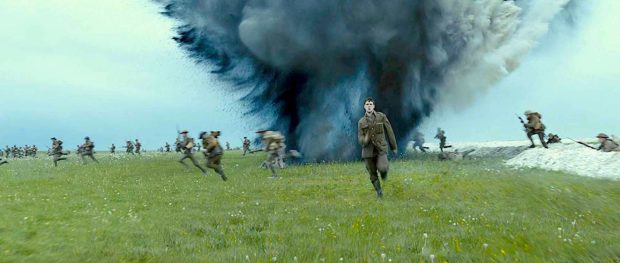‘1917’: Sam Mendes’ immersive war drama puts viewers on the front lines of war

Sam Mendes’ groundbreaking war film “1917,” which opens in Philippine theaters tomorrow, is instructive for lazy, self-important actors who prefer to paraphrase dialogue and think rehearsing scenes is beyond them.
The performers of the movie, which is tipped to win best picture at the Oscars next week (Feb. 10 in the US, the 11th in Manila) if Bong Joon-ho doesn’t rain on its award-reaping parade, had to rehearse their scenes for six months before principal photography even began.
That’s about twice as long as the April-to-June schedule it took the production to shoot the actual scenes last year. It was as much a logistical challenge (they dug up 5,200 feet of trenches for the scenes) as it was a technical issue for Mendes and his team to hurdle.
Alas, all that hard work has gloriously paid off in spades, embedding viewers on the frontlines of war in scenes that look like each of them were shot in a single, continuous take. Its immersive look needs to be seen on the big screen to be fully enjoyed and appreciated.
For instance, people are raving about George MacKay’s thrilling (and seamlessly edited) final run to accomplish his character’s mission, but there’s so much more to it than its life-or-death pertinence. It doesn’t just highlight the needlessness of war, but also underscores the sacrifices people make for the greater good.
Set in France during World War I, the movie follows the do-or-die mission of young British soldiers Will Schofield (George MacKay) and Tom Blake (Dean-Charles Chapman) after they’re tasked by General Erinmore (Colin Firth) to carry a message ordering Colonel Mackenzie (Benedict Cumberbatch) to call off a scheduled attack against the German army.
Aerial reconnaissance believes that the Germans have pulled back from their known post to ambush the unsuspecting British army with artillery—but not if the latter’s intended attack is called off.
At stake are the lives of 1,600 soldiers of the Devonshire regiment. But the task has more personal significance for Blake: His older brother, Joseph (Richard Madden), is part of Mackenzie’s Second Battalion.
Unfortunately, time is running out, prompting the young soldiers to make a mad dash to no man’s land to reach the abandoned German trenches!
Schofield and Blake hurdle challenges that put their mission at risk, sometimes exposing them to situations that compel them to make difficult choices—like saving the life of an enemy after they see a German plane being shot down by the British forces, or sharing their food and milk to a hapless but helpful mother with a hungry infant, or whether or not to jump off a waterfall to escape imminent death at the hands of vengeful foes.
The situations seen in this war-themed movie sound perfunctory on paper, but the way Mendes stages them subverts moviegoers’ expectations about the protagonists’ impossible mission and the race against time to accomplish it.
Mendes delivers a tense, taut and thrilling thinking man’s actioner that eventually comes off like a gorgeously nuanced, coming-of-age theater piece. Unnerving as it is rousing, the movie is served well by an irresistible conflict and empathetic characters, often putting moviegoers in its protagonists’ shoes when tasked to choose a side in the moral divide.
But don’t take our word for it: “1917” is better seen than discussed. For true-blue film enthusiasts, it’s a can’t-miss cinematic event. INQ